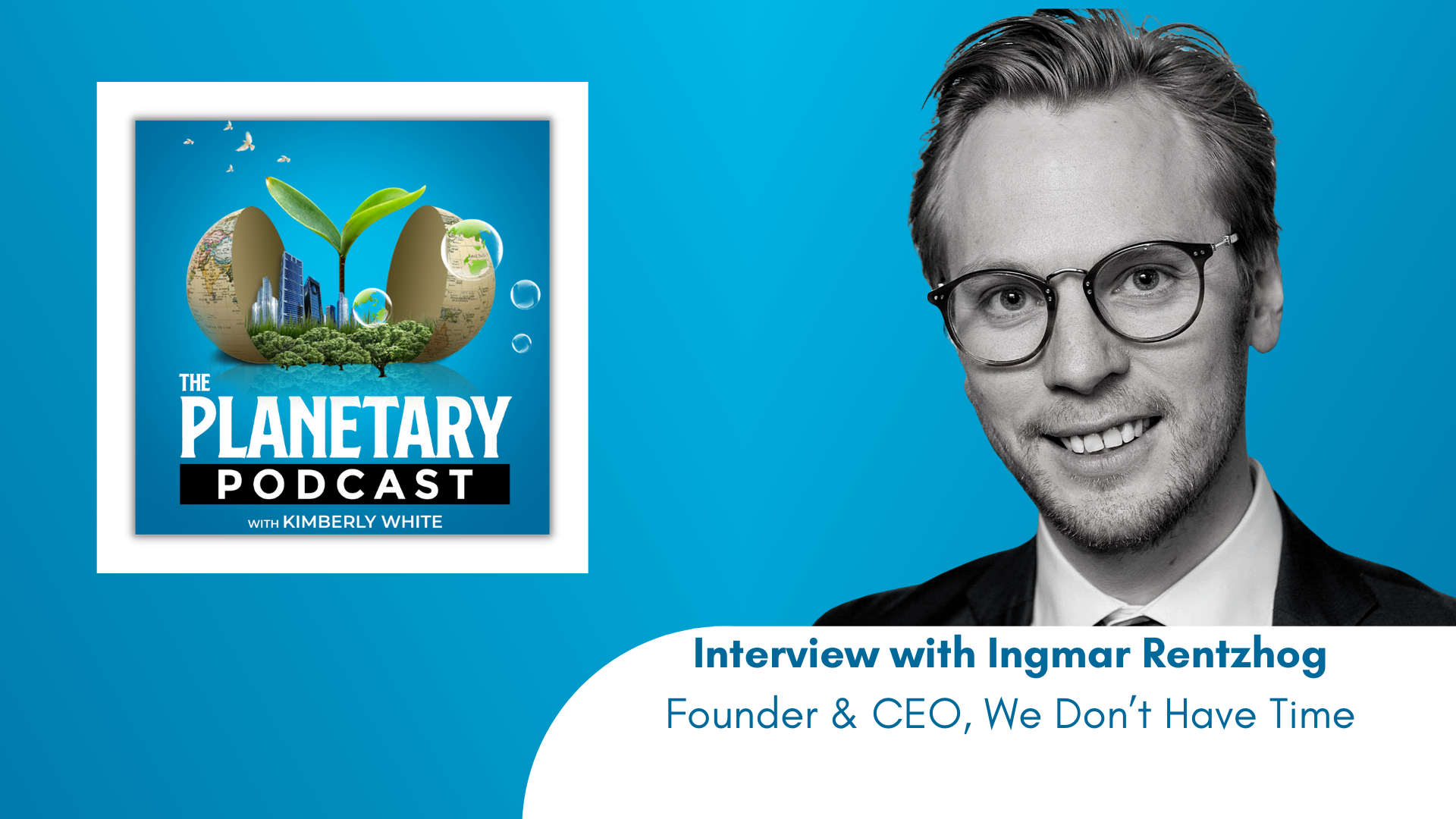Interview Transcript
Transcribed by Otter AI
Kimberly White
Hello and welcome to The Planetary Podcast. Today we are joined by Ingmar Rentzhog, Founder of We Don’t Have Time. Thank you so much for joining us today, Ingmar!
Ingmar Rentzhog
Thank you so much, Kimberly.
Kimberly White
You and the We Don’t Have Time team are doing a fantastic job bringing global awareness to the climate crisis. Before we get started on that, can you tell us about your background and how you got started in the climate movement?
Ingmar Rentzhog
Yes, actually, my background is that I’ve not been an environmentalist or anything like that; I’m an entrepreneur. I’ve been working with creating businesses my whole grown-up life. And previously, I worked in the finance industry, where I helped financial companies, big banks, insurance companies, etc., to communicate. We had 50 employees at the last company I was running. And the reason why I sold that company and not work in finance anymore is that I realized I started to read about the climate crisis when I became a father myself. That was actually nine years ago, when I got my first child, and I started to read about the future with a bit of a longer time perspective. And I read a lot about climate change and all that, and I realized that the problem is so much more severe than most people were aware of back then. So that is what the starting point was for me to become more and more involved. And four years ago, I decided to try to do something myself and founded We Don’t Have Time. And what I would like to add is the time frame here, I mean, the name of our organization is We Don’t Have Time, and what we mean is that we don’t have time to wait, we need to act now. And that is very, very clear because it was nine years ago, I started to get to know this issue and then started to engage for climate. Today, there are less than nine years left until the year 2040. That’s the real deadline, where we have to halve the world’s emissions before that. We only have nine years left. Nine years is a very, very short time period. We can do a lot in nine years, but we can’t wait.
Kimberly White
Absolutely, each year we learn more about how severe the impacts of climate change will be and how far-reaching. It’s not just something that will happen in some far-off place- it’s going to impact everyone everywhere. Now, you founded We Don’t Have Time in 2017. Can you tell us what the inspiration behind this was and a little bit about the process of starting a climate-dedicated social media platform?
Ingmar Rentzhog
Practically all the global leadership is failing us. So if they are not going to solve this problem, who will? So that’s where I started to think: can I use my skills to try to help out? The problem is that the climate crisis is a global crisis; we can only solve it if we work on a global level. And we have a short time period to act. I have started to look at other areas where people have succeeded in creating global change in a very short time period. And social media networks are those companies that have changed the world on a global level, for better and for worse, but they have changed it in a very short time period. So that’s where the idea to create a social network focused on the climate crisis and try to use that technology in order to create fast global change.
Kimberly White
How do you see the role of social media in sparking climate action in this Decade of Action?
Ingmar Rentzhog
I will say that social media is very important, but what’s most important is communication. Many people see communication as something that you need to do when you are doing the action. But action is what needs to be done, and it’s a good way to communicate it. I see it a little bit differently. I see it like this: communication is one of the most important climate actions. But you can’t just talk; you also need to act in order for your communication to be efficient. So it’s just as important to communicate your climate action as doing it. But if you’re only communicating, it’s worthless; no one will listen to you. But the other way around, if you’re only doing climate action, and you’re not communicating it, you’re not inspiring other people to follow- it doesn’t matter. And this is true if you’re a private individual that is trying to make more climate-friendly choices. You need to communicate it, you need to inspire others, and you need to also communicate and demand change from others. The very same thing is true for companies and organizations. It’s not enough if you’re succeeding with a target, if everyone else is failing, we will still fail. So everyone has an obligation to use their communication skills in order to leverage and amplify your climate action. But in order for people to listen to your communication, it’s absolutely essential that you do the action and not just communicate.
Kimberly White
I agree with that, especially from the communications standpoint. When it comes to sustainability actions, especially from companies and some NGOs as well, there’s a communication problem. Their messages are not always reaching the public- or other companies- on what they’re doing. As you said, this can inspire other people to do those actions in their everyday lives or businesses. It is important to balance action with a strong communication message. The We Don’t Have Time platform has thousands of users. What have been some of the most promising solutions you’ve seen on your platform?
Ingmar Rentzhog
What our platform is all about is two things, awareness, and dialogue. The awareness is that many people today are actually aware of the problem, how bad the climate crisis is, but not so many people are aware that we have all the solutions we need. We just need to implement them, scale them and use those solutions. It’s just as important to communicate that we have the solutions as that we need to use them. So one part of the We Don’t Have Time platform is about sharing climate solutions and educating the world about that. It exists so other people and other organizations can copy it, and also encourage the ones that are implementing the solutions so that they will get motivated and do more. So what we have seen on the We Don’t Have Time platform, it’s not just one solution. I will say it’s the many solutions that you have, the solutions everywhere. There are often so many problems when you look into the climate space. You have problems with everything we do, everything from food production, to how to build houses, etc. But there are actually solutions to manage those problems. So you can build houses with green cement that are not emitting carbon emissions. You don’t need to stop building houses; you just need to build them differently. In agriculture, you can produce food in a different way that is more sustainable; it’s a lot of solutions out there, too. So I would say it’s not one solution that is big on the We Don’t Have Time platform that is a diverse area of many solutions, but most of those solutions are a challenge to implement on scale, and it’s also today, much more expensive to implement. So most businesses, organizations, and individuals are not using them, either because they don’t know about them or when they know about them, they can’t afford them. And that’s why it’s so important to actually change capitalism so that it will be cheaper to do the right thing and very, very expensive to do the wrong thing. In order to make that happen, we have the other aspects of the We Don’t Have Time platform, and that is the dialogue aspect, where you communicate directly with corporate leaders, political leaders, public figures, and you can tell them what they are doing good. So you will help them inspire others; you will help them have the courage to do things. You can also tell the ones that are not doing enough to do more and tell them what they need to change. If they don’t change, that will create negative awareness about that company or political leader. And if you have negative awareness about your company, your brand, that will cost you. So the We Don’t Have Time platform is helping make the bad choices more expensive, and the right choices much cheaper and more profitable.
Kimberly White
So the We Don’t Have Time app is helping to hold climate offenders accountable for their actions?
Ingmar Rentzhog
Yes, but it’s also helping the ones that are acting to get more out of it, get more credit, get more encouragement, and also inspire a lot of others to follow them. That is something that we are quite alone doing in the climate space. There are a lot of activists out there that are very good at calling out and shaming corporate leaders when they are not doing enough and they are doing the wrong thing, and that is something absolutely important. That is very good that many people are doing, but we should not forget to give credit to those who are doing the right thing. And positive feedback is something that is not so common out there. And I actually believe that positive feedback can be a much more efficient enabler for change compared to negative feedback, but you need both in order to drive change.
Kimberly White
Who can join the platform?
Ingmar Rentzhog
It’s for everyone. So today, we have members in over 140 countries using it, and it’s everyone from a beginner that doesn’t know so much at all about the climate and environment to people that work with this every single day that are sharing their knowledge with other users, etc. So it’s really a community where people are helping each other around, focusing on trying to find solutions to the problems. And if a company is doing something wrong, or the community loves them if they are asking for help and trying to change. I love it when I see corporate leaders, corporations, or political leaders admit that they were wrong. I think that the best way of leadership is to admit that you are not perfect but that you could change your decision if you receive better information. One example of what the role that the We Don’t Have Time platform actually can play here is Elon Musk and Tesla. A couple of months ago, Elon communicated that his companies were starting to receive payment in Bitcoins. And that’s not a good thing for the climate because bitcoins are so energy inefficient. One Bitcoin transaction is like 500,000 normal credit card transactions. So it’s really not good; it’s consumed a lot of energy, a lot of fossil fuels, etc. So you could question that green energy car company to receive payments in Bitcoins. And that is something we saw a lot of engagement in on our platform, talking about this and talking about this with Tesla and Elon Musk, we sent over the conversation to his team, etc. A couple of months later, he made a statement, sold all his bitcoins, and told everyone that Tesla would not use this because it’s not environmentally friendly. That is great leadership because great leadership is about listening to people, listening to facts, and changing accordingly.
Kimberly White
Absolutely, to be a good leader, you have to admit when you’re wrong and not just double down defending what you were wrong about. It’s great that the We Don’t Have Time platform could be a catalyst for that conversation. Now, in April, We Don’t Have Time hosted its second Exponential Climate Summit. Can you share with us some of the key takeaways and calls to action from this event?
Ingmar Rentzhog
Yes, we have a long history. We did the world’s first digital climate conference on Earth Day 2018, and today it is kind of strange because with corona everyone is doing those global digital events. But the world hasn’t done that for as long, and we have a great tradition of doing really global broadcasts with many viewers out there. This Earth Day, we hosted the fourth annual conference where we were focusing on finance because finance plays a great role in how businesses are operating. If you don’t give bad companies access to investments, that is a huge change maker. Also, the other aspect if you invest in those companies working for solutions, that is also amplifying them and helping them. So money is a great change maker. We should stop giving money to the bad ones and start giving money to the good ones. So we focused on finance. What we see here and what you can learn when you watch the conference- we had speakers from everything from big, large asset management firms to smaller firms that are really niche in this and activists and everything in between- and what you see here is there are a lot of things happening in the finance industry for climate, but as in all other areas, it’s moving too slow. So it’s more talk than action, and we need to step up the action and continue to talk, of course, but we need more action. So that was our conclusion. But we also saw that finance is actually something that is driving change fast. What we’re going to see, or already started to see, is the conversation, asset managers need to be asked questions from journalists, etc. ‘Why are they still investing in oil?’ The conversation nowadays is not just about ethics. It’s also about why are you losing your customers’ money by still investing in oil? So I will say investments and the finance industry is a big enabler for capitalizing change. It has just begun, this transformation in the finance industry is going to play a huge, important role. But we need it to happen a little bit sooner than it will happen by itself.
Kimberly White
Definitely, a recent report found that 60 of the world’s largest banks have collectively put $3.8 trillion into fossil fuels since the Paris Agreement was signed. Now, given your expertise, what advice do you have for people who want to use their money more sustainably?
Ingmar Rentzhog
Do your research and try to work with a bank or asset manager that doesn’t just have a climate-friendly choice that you can choose without one of many. Instead, try to hire the bank that has sustainability within the whole operation. That’s not so easy to find, actually. But there are some examples out there. Use Google and educate yourself about where you can find the financial players that are really really walking the talk here, not just having some of their funds be climate-friendly, but all of their funds, etc. The finance industry is kind of tricky because it’s different from country to country. It’s hard to find them. Most big asset managers are still doing a lot of strange things in the fossil fuel industry. So, if you can’t find this bank or asset manager that can help you, what you can do instead is to talk to the ones you already have a relationship with and be a really, really pain in the ass to help them to change.
Kimberly White
What message do you have for companies hesitant to make the transition to more sustainable climate-positive practices?
Ingmar Rentzhog
Start somewhere and start with what you can do right here, right now. If you’re not an expert-and most companies that are starting are not experts, obviously- don’t be afraid to involve your stakeholders, your existing customers, your existing employees, etc. If you have many of them, you will probably find the ones that are engaged in the climate already and are willing to help. So my advice is, don’t be afraid to ask for help and listen to people that are engaged in this. Go to We Don’t Have Time and get help doing it. But you can also ask your existing employees in your business, take a big meeting and then involve them.
Kimberly White
Can you tell us about any future events or projects?
Ingmar Rentzhog
Yes, we have big plans for the Climate Week NYC in September. We are going to make a new broadcast where we’re going to focus on circularity because we have a huge challenge in front of us: how are we going to have all the resources to last? When are we going to electrify all the transportation? When are we going to build renewable energy and batteries, etc.? What’s happening now is that we’re making the same mistake when we built the last society from fossil fuels. We’re now risking or repeating that mistake. So it’s very important that we are, from the beginning, doing things in a circular way where we’re not throwing away the battery when it’s not working anymore, but where we can reuse it over and over again, in a circular way. It’s very important that we don’t just solve today’s short-term problem, but we also have a much longer time perspective when we’re building the new fossil-free society.
Kimberly White
Thank you, Ingmar. Before we go, do you have anything else you’d like to share with our audience?
Ingmar Rentzhog
Yes, I will say this year is going to be a very important year. We didn’t have a climate meeting last year because of the coronavirus. Hopefully, we’re going to have the COP26 meeting in Glasgow this year. We are going there and we are going to have daily broadcasts within Glasgow in the diplomatic zone. We’re going to do what I think the United Nations should do. We’re going to invite everyone to participate through us in a more digital way because the climate meeting can’t just be for diplomats and politicians and big corporation leaders. Everyone should be involved in this because it concerns everyone. I think the only way forward for climate solutions to actually succeed, is to invite and engage as many people as possible. And that’s where the Paris Agreement has failed so far. People are not engaged in the Paris Agreement. Most people don’t even know how it works. So in order to have the Paris Agreement succeed in the future, we need to involve civil society and as many people as possible.
Kimberly White
Thank you so much for joining us, Ingmar! Alright, that’s it for today. We Don’t Have Time, a social network for everyone who wants to be a part of the solution to the climate emergency. In order to curb climate change and make our societies more sustainable, we need everyone, everywhere to take part. Be sure to sign up for the app! We’ll see you there! Please join us next time for another episode of The Planetary Podcast.







